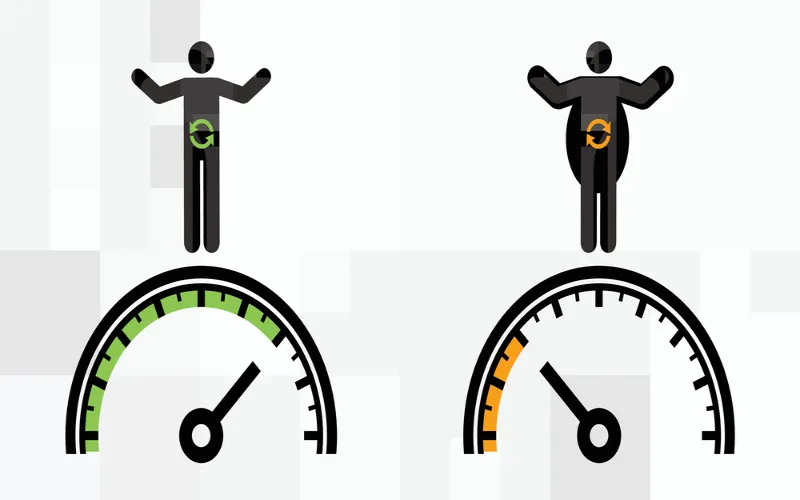Have you ever heard someone complain, “I eat whatever I want, but I just can’t seem to gain weight?” While many are battling the scale trying to shed pounds, a subset of individuals desperately seek ways to stabilize or even increase their weight. In many cases, the culprit is an overactive metabolism that burns calories faster than one can consume. So, for those seeking a reprieve, the question becomes, how to slow a metabolism? We are about to delve into the intricacies of metabolic regulation and provide you with actionable steps to manage it. But before we dive deep, let’s touch upon a product that’s making waves in the health and aging industry and may have implications for metabolic management.
Understanding Metabolism
Metabolism comprises all the chemical reactions occurring in our bodies to keep us alive. It can be categorized into two:
- Anabolism: Building complex molecules from simpler ones, e.g., muscle formation.
- Catabolism: Breaking down complex molecules to release energy, e.g., digestion.
Factors Influencing Metabolism
Several factors determine your metabolism rate, including age, muscle mass, body size, genetics, and activity level. A faster metabolism burns calories quickly, often leading to weight loss, while a slower one can result in weight gain.
Techniques to Slow Down Metabolism
While many seek ways to boost their metabolism, there exists a need for techniques to slow it down intentionally. By adjusting dietary habits and modifying exercise routines, one can better regulate their metabolic speed to align with their health goals.
Adjust Your Diet
Tweaking your dietary intake can be a strategic approach to influencing your metabolic rate. The foods you consume and the timing of your meals play pivotal roles in determining how quickly or slowly your body burns energy.

Increase Simple Carbohydrates
Consuming foods rich in simple carbohydrates, like sweets and sodas, can spike your blood sugar and insulin levels, potentially slowing down your metabolism.
Limit Caffeine Intake
Caffeine can boost metabolism. Reducing coffee, tea, and energy drinks might help slow things down.
Modify Your Exercise Routine
Your workout regimen has a direct impact on your metabolism. Your exercise type, intensity, and frequency can help you achieve the desired metabolic pace.
Reduce Cardio
Cardio exercises like running or cycling elevate the metabolic rate. Consider reducing their intensity or frequency.
Incorporate Relaxation Techniques
Stress can rev up your metabolism. Incorporating relaxation techniques like yoga or meditation can help calm the body and potentially slow the metabolic rate.
The Risks of Slowing Metabolism Intentionally
It’s crucial to approach the idea of intentionally slowing down metabolism cautiously. Doing so without proper guidance can lead to undesirable health outcomes such as increased fat storage, decreased muscle mass, and potential hormonal imbalances.
The Unexpected Hero: Biom NMN Anti-Aging Suppository
The Biom NMN Anti-Aging Suppository stands out in the realm of health supplements. NMN, or Nicotinamide Mononucleotide, is a molecule that plays a key role in energy production within our cells. Combined with Pterostilbene, another powerful anti-aging compound, it potentially protects against age-related metabolic changes. Understanding how such products affect our body’s internal processes, we might find ways to maintain a healthy balance between too-fast and slow metabolic rates.
Conclusion
While the quest to understand how to slow metabolism can be valid for some, it’s vital to approach it in a balanced and informed manner. Consult with a healthcare professional before significantly changing your diet or exercise routine. As we age and look for ways to maintain optimal health, we must be receptive to innovations like the Biom NMN Anti-Aging Suppository, but always within a holistic approach to health and wellness.
Is it safe to slow down metabolism?
While it can be safe for some individuals under specific circumstances, it’s essential to consult a health professional before altering your metabolic rate.
How does age affect metabolism?
Our metabolic rate generally slows down as we age, primarily due to decreased muscle mass and hormonal changes.
Can supplements like Biom NMN affect metabolism?
NMN plays a role in cellular energy production, which can influence metabolism. It’s best to discuss the potential impacts with a healthcare provider.
Are there natural ways to slow metabolism?
Adjusting diet, altering exercise routines, and managing stress are natural methods to influence metabolism.
Why would someone want to slow down their metabolism?
Some individuals might want to stabilize or gain weight, while others may be addressing specific health conditions or concerns.




